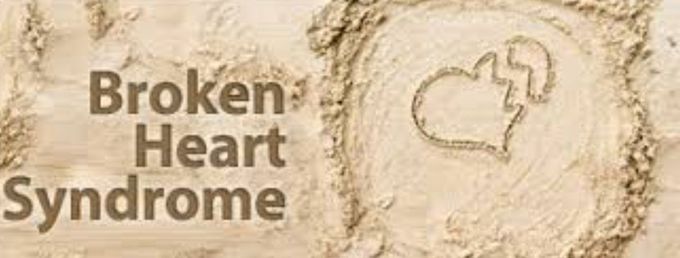


Broken heart syndrome
Overview Broken heart syndrome is a temporary heart condition that's often brought on by stressful situations, such as the death of a loved one. The condition can also be triggered by a serious physical illness or surgery. People with broken heart syndrome may have sudden chest pain or think they're having a heart attack. In broken heart syndrome, there's a temporary disruption of your heart's normal pumping function in one area of the heart. The remainder of the heart functions normally or with even more forceful contractions. Broken heart syndrome may be caused by the heart's reaction to a surge of stress hormones. The condition may also be called takotsubo cardiomyopathy, apical ballooning syndrome or stress cardiomyopathy by doctors. The symptoms of broken heart syndrome are treatable, and the condition usually reverses itself in days or weeks. Symptoms Broken heart syndrome symptoms can mimic a heart attack. Common symptoms include: Chest painShortness of breath Any long-lasting or persistent chest pain could be a sign of a heart attack, so it's important to take it seriously and call 911 if you experience chest pain. When to see a doctor If you're having any chest pain, a very rapid or irregular heartbeat, or shortness of breath after a stressful event, call 911 or emergency medical assistance immediately. Causes The exact cause of broken heart syndrome is unclear. It's thought that a surge of stress hormones, such as adrenaline, might temporarily damage the hearts of some people. How these hormones might hurt the heart or whether something else is responsible isn't completely clear. A temporary constriction of the large or small arteries of the heart has been suspected to play a role. Broken heart syndrome is often preceded by an intense physical or emotional event. Some potential triggers of broken heart syndrome are: News of an unexpected death of a loved oneA frightening medical diagnosisDomestic abuseLosing — or even winning — a lot of moneyStrong argumentsA surprise partyHaving to perform publiclyJob lossDivorcePhysical stressors, such as an asthma attack, a car accident or major surgery It's also possible that some drugs, rarely, may cause broken heart syndrome by causing a surge of stress hormones. Drugs that may contribute to broken heart syndrome include: Epinephrine (EpiPen, EpiPen Jr.), which is used to treat severe allergic reactions or a severe asthma attackDuloxetine (Cymbalta), a medication given to treat nerve problems in people with diabetes, or as a treatment for depressionVenlafaxine (Effexor XR), which is a treatment for depressionLevothyroxine (Synthroid, Levoxyl), a drug given to people whose thyroid glands don't work properlyHow is broken heart syndrome different from a heart attack? Heart attacks are generally caused by a complete or near complete blockage of a heart artery. This blockage is due to a blood clot forming at the site of narrowing from fatty buildup (atherosclerosis) in the wall of the artery. In broken heart syndrome, the heart arteries are not blocked, although blood flow in the arteries of the heart may be reduced. Risk factors There are a number of known risk factors for broken heart syndrome, including: Sex. The condition affects women far more often than men.Age. It appears that most people who have broken heart syndrome are older than 50.A history of a neurological condition.People who have neurological disorders, such as a head injury or a seizure disorder (epilepsy) have a greater risk of broken heart syndrome.A previous or current psychiatric disorder. If you've had disorders, such as anxiety or depression, you probably have a higher risk of broken heart syndrome.Complications In rare cases, broken heart syndrome is fatal. However, most who experience broken heart syndrome quickly recover and don't have long-lasting effects. Other complications of broken heart syndrome include: Backup of fluid into your lungs (pulmonary edema)Low blood pressure (hypotension)Disruptions in your heartbeatHeart failure It's also possible that you may have broken heart syndrome again if you have another stressful event. However, the odds of this happening are low. Prevention There's a small chance that broken heart syndrome can happen again after a first episode. There's no proven therapy to prevent additional episodes. Many doctors recommend long-term treatment with beta blockers or similar medications that block the potentially damaging effects of stress hormones on the heart. Recognizing and managing stress in your life may also be important in helping to prevent broken heart syndrome, though there's currently no evidence to prove this. By Mayo Clinic Staff

